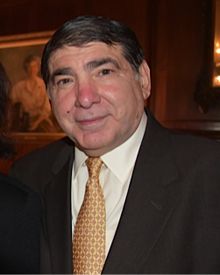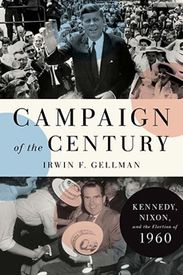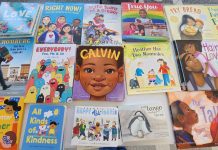Irwin Gellman isn’t afraid to talk about any bad reviews for his books. The Jewish author and historian has received his fair share of scrutiny for his most recent book “Campaign of the Century: Kennedy, Nixon, and the Election of 1960,” but Gellman believes it’s just par for the course.
The book, released on Jan. 22, 2022, details the 1960 presidential election between Democrat John F. Kennedy and Republican Richard Nixon. Counter to the election’s well-accepted narrative, Gellman argued, the relationship between the two candidates was actually cordial, and had the election not been altered by scandal, Nixon would have won.
“Because I’m changing the narrative of how we look at the ‘great’ John Kennedy and the ‘evil’ Richard Nixon, there are people that look upon me as the lowest form of life,” Gellman said. “You don’t change a narrative that you want to be a narrative and not pay
the price.”
If an angry reader leaves a one-star review on Amazon, the 80-year-old author doesn’t mind. Yale University, which published Gellman’s book, nominated the author for a Pulitzer Prize and a National Book Award.
On March 4, Gellman, a West Chester resident, will discuss his newest book at a signing at Tredyffrin Public Library in Wayne. All proceeds from the evening will be donated to Beth Chaim Reform Congregation, where Gellman is a member.
Gellman, with 27 years of experience researching Nixon, has worked to set the record straight. According to the author, Theodore White’s “Making of the President 1960,” a seminal book in political journalism, got the story wrong, pitting the two presidential candidates against each other and overstating Kennedy’s primary victory in West Virginia, in which he won a sweeping victory among a population that was about 95% Protestant.
Instead, Gellman said, Kennedy paid an exorbitant amount of money campaigning in the state that essentially amounted to corruption.

And while Gellman agrees that the outcome of the general election was close, he believes that it would have swung in Nixon’s favor had there not been scandal, including alleged vote fraud in Texas, Kennedy’s vice presidential nominee Lyndon Johnson’s home state, and Illinois.
Throughout his career — including bachelor’s and master’s degrees from the University of Maryland and a doctorate from Indiana University-Bloomington — Gellman has observed that once a mistake in recording history is made, there’s little effort to correct the course.
“Once they get it wrong, they won’t bother to check sources,” Gellman said of some historians.
In an age of information that is so democratized that much of what is being disseminated is false, Gellman argues that the key to finding the truth is thoroughly searching for it.
“What I learned in graduate school was a mass of different views,” he said. “But when it comes down to it, and push comes to shove, it’s how you do the research.”
When Gellman was researching for “Campaign of the Century,” he said that when he wrote about Kennedy, he was a Democrat, and when he wrote about Nixon, he was a Republican. He removes himself from his opinions and instead embodies what the sources he’s reading about are telling him.
Though Gellman removes his personal politics and identities from his research, his Jewish identity still shines through in his scholarship at times.

“Probably the speech I give that gets the most passionate response from audiences is [about] the American response to the Holocaust,” Gellman said. “And I don’t try to make it emotional, and I don’t try to make it passionate. It just comes out that way.”
Rabbi Michelle Pearlman of Beth Chaim argues that, even when Gellman does not write or speak about Jewish topics, his work reflects Jewish values.
“One of God’s names is emet. … One of God’s names is truth,” she said. “So, I think there’s a big spiritual value, a prominent spiritual value in Judaism about discernment of the truth.”
Gellman grew up in the suburbs of Baltimore, one of the few Jews in a mostly Polish Catholic neighborhood. Though his family was ambitious and accomplished, Gellman grew up not thinking of himself as exceptional. Despite how he viewed himself, Gellman received his doctorate at 25.
“I wasn’t so smart to get my degree in that time, I thought. I was just tired of being poor,” he said.
After spending decades researching 20th-century presidents such as Franklin Delano Roosevelt and the U.S. response to the Holocaust — his 1995 book on the topic earned Gellman his first Pulitzer Prize nomination — Gellman became a Nixon scholar at the behest of his wife Joanne Borin. At the time, the couple lived in California.
“She said, ‘Why don’t you go to the Nixon library that’s half an hour away?’” Gellman recounted. “I wasn’t interested in Richard Nixon! I couldn’t care less.”
After befriending the librarian there and spending time in the stacks, Gellman became a Nixon scholar. The author is working on “only” three books, including a book on Nixon in the 1960s.
His work includes listening to 4,000 hours of tape and looking through 500 various manuscripts, searching for the truth.
“That’s what I’m doing: I’m upstairs, reading a massive amount of material trying to find out if it’s good or bad or indifferent, and then going from there,” he said.






